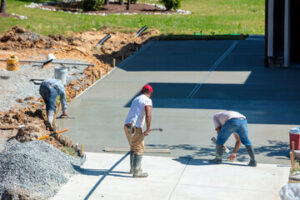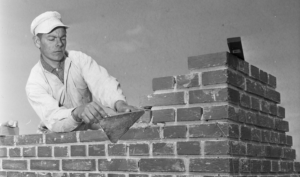Concrete is a common construction material, but it requires specialized knowledge to work with it. Concrete Contractors have the skills to build concrete structures that conform to building codes and look professional.

Finding the right contractor can make or break your project. Ask for a list of previous clients and contact them to learn more about their experience working with the contractor.
Concrete contractors are skilled professionals who specialize in turning your construction vision into a tangible reality. They bring together elements of science, engineering, and artistry, sculpting concrete into captivating forms. Their experience and expertise ensure that your project is done right the first time, eliminating costly rework down the road.
Before any concrete work begins, a reputable contractor will carefully evaluate your site and project specifications. This allows them to provide you with a detailed schedule and plan that aligns with the local construction landscape. A reliable contractor will also be able to address any potential challenges that may arise during the project, quickly and effectively addressing them in a way that minimizes disruption and maintains project momentum.
Throughout the project, a dependable contractor will maintain open channels of communication, responding promptly to your inquiries and demonstrating a collaborative spirit. This will help you develop a relationship of trust and confidence with your contractor, contributing to the overall success of your project.
When choosing a concrete contractor, ask about their insurance coverage. They should carry a comprehensive general liability insurance, workers’ compensation insurance, and auto insurance policy to protect you from property damage and bodily injury claims that could occur during the course of your project. A reputable contractor will also be able to provide you with a certificate of insurance (COI) for your review, which details the types and limits of coverage.
Whether you’re looking to add curb appeal to your home or create an industrial-inspired office space, a reputable concrete contractor will collaborate with you and your design team to transform concepts and blueprints into beautiful, functional spaces that reflect your unique style and vision. Their dedication to collaboration and a passion for the craft allow them to take your concrete projects to new heights, crafting spaces that are both visually stunning and built to last.
A reputable concrete contractor will stay up-to-date on the latest concrete technology and practices, allowing them to offer innovative solutions that improve the look and functionality of your projects. This includes incorporating eco-friendly materials and utilizing energy-efficient curing methods. In addition, a qualified concrete contractor will have access to specialized tools and equipment that are not available to the average homeowner, enabling them to complete your project in less time and at a lower cost.
They Are Passionate About the Craft
Concrete construction is more than just a job for contractors; it’s a passion. Whether they are completing repairs on existing concrete or installing a new foundation, they are constantly searching for ways to improve their craft. Having this type of dedication to their work will help ensure that you are getting the best results possible from your contractor.
One of the most important traits to look for in a concrete contractor is a commitment to excellence. A good contractor will not only take the time to listen to your ideas and concerns, but they will also provide professional advice throughout the process of bringing your project to life. Their goal is to ensure that all your expectations are met and that the project is completed within budget and on schedule.
Experience is another key element to consider when choosing a concrete contractor. A more seasoned contractor will be able to anticipate challenges that may arise and will have a better understanding of how to deal with them. Moreover, they will have worked with many different types of materials and will be able to adapt their approach depending on the situation.
When looking for a concrete contractor, ask to see samples of their previous projects and request references from past clients. Contacting these customers will help you gain a clearer picture of the contractor’s abilities and customer service style. In addition, asking for quotes from several contractors will allow you to compare pricing and make an informed decision.
In addition to their technical skills, concrete contractors need practical time management skills to maintain project profitability and keep unforeseen delays at bay. Contractors must be able to assess the site and determine a timeline that takes into account factors like weather, material supply, and other variables.
Additionally, a good contractor will have the equipment necessary to achieve top-notch results. From volumetric mixers to diamond-impregnated saws, a well-equipped contractor will be able to turn your concrete projects into reality with minimal headaches.
They Stay Up-to-Date
Concrete is a simple construction material, but the way that it is poured, smoothed and finished can dramatically affect its final appearance and functionality. Good contractors pay attention to these details and work to ensure that their results exceed client expectations. They are also aware of changing industry trends and can apply new techniques to their projects as needed.
Finding the right concrete contractor for your project starts with researching their experience and reputation. Request a portfolio of previous projects, and contact previous clients to ask questions and obtain insights into their working relationship with the contractor. A reliable concrete contractor should be willing to provide detailed quotes, answer questions clearly and concisely, and keep you informed throughout the project.
When selecting a contractor for your project, it is important to find one that specializes in the type of concrete finish you require. Concrete finish varies by type, so contractors who specialize in decorative concrete for patios, sidewalks and other outdoor surfaces may not be the best choice for pouring foundations or other structural elements. Ask potential contractors about their preferred materials, concrete mix designs and if they have any specialty concrete services that they offer.
Choosing a contractor with the right technical expertise for your project can save you money in the long run. For example, concrete professionals have the ability to optimize their use of materials, which can help cut costs by eliminating excess or wasteful components. They can also suggest cheaper materials or processes to achieve the same results as more expensive options.
In addition to finding a contractor with the right technical expertise, it is critical to look for a professional who has the right business practices in place. A reputable contractor should be insured and bonded, and should follow all applicable local and state regulations. They should also be transparent about their quality control procedures and warranty policies.
The right concrete contractor can make or break your construction project. To ensure that your concrete project is completed on time and within budget, select a contractor with the skills, expertise, and experience to meet your specific requirements.
They Are Reliable
Concrete contractors play a crucial role in shaping the infrastructure and aesthetics of both residential and commercial spaces. They bring expertise, innovation, and precision to a wide variety of projects, from crafting robust foundations for skyscrapers to adding decorative finishes to driveways. Choosing the right contractor can make all the difference in completing your project on time and within budget.
A reliable contractor will provide a detailed quote that clearly specifies all expenses, including the cost of materials, labor, and any other additional charges. Be wary of significantly lower quotes, as these may indicate subpar materials or cutting corners that could impact the quality of your finished product.
Moreover, a reliable contractor will maintain open communication with clients throughout the process to ensure they’re aware of any changes or challenges that might arise. This can help ensure that unforeseen expenses are kept to a minimum and prevent any disputes down the line.
Finally, a reliable concrete contractor will have comprehensive insurance coverage to protect both themselves and their clients. This can include general liability, worker’s compensation, and automobile coverage, among others. Be sure to ask prospective contractors about their insurance policies and verify that they have sufficient coverage before hiring them for your project.
There are many ways to find a qualified concrete contractor, from local business listings to professional association directories. However, the most effective approach is often to seek recommendations from friends, family members, and other construction professionals who have worked with a particular company in the past. These referrals can offer valuable insights into the range of services a contractor provides, as well as their quality and reliability.
In addition, it’s important to choose a concrete contractor with extensive experience in the type of work you need done. This will ensure that they have the necessary skills to handle unexpected challenges that might arise during your project and that they’re familiar with the industry standards and best practices for a high-quality outcome. You should also ask potential contractors for a portfolio of previous projects and request references from past customers.
